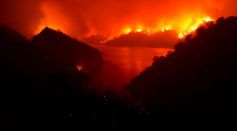ENVIRONMENT & CLIMATE

Man Shows How Soft a Beluga Whale's Head Is

Viking Stock: Norse Horse Can Withstand Iceland's Elements All Year-Round

Fight Climate Change While Eating This Eco-Friendly Diet

Former Passenger Planes Repurposed to Fight Wildfires

California Wildfires Visible From Space, Astronaut Sends "Thoughts and Prayers"
A Norwegian Startup Is Turning Dry Deserts Into Fertile Cropland

Lanternfly Infestation Threatens East Coast Farms
Brood Parasites "Diversify Portfolios" In Times of Environmental Flux

Polar Blast Set To Hit Australia This Weekend, First in 15 Years
Warm Florida Waters Cause Coral Bleaching & Kill Thousands of Fish
Which Dinosaur Bone Helps Support Their Weight?
Rare Bacteria Known to Survive Solely on Air in Antarctica, Now Found Elsewhere

Seattle-Based Company Develops Beanless Coffee

Oil Drilling Will Continue in the Arctic National Wildlife Refuge
Most Popular

Blood Moon to Appear During Total Lunar Eclipse on March 3, 2026

NASA Reveals an Astronaut Was Medically Evacuated From the ISS for the First Time After a Non-Emergency Health Scare

The Science of Aging: What Cellular Aging and Telomeres Reveal About Human Longevity

How Volcanoes Destroy, Build Land, and Shape Earth's Surface and Climate





